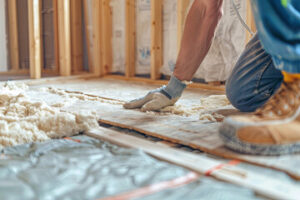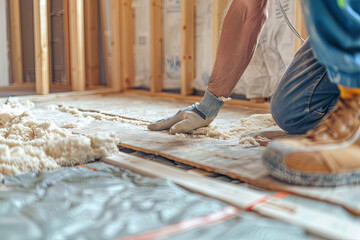Ceiling Insulation Perth keeps indoor temperatures moderate and comfortable, reducing energy costs and making your home more eco-friendly. It also provides soundproofing.

Choosing the best insulation depends on your needs. Some products like fiberglass batts are DIY-friendly, while others like spray foam and blown insulation require professional installation. The best insulation is closed-cell spray foam, which has the highest R-value and offers an airtight seal to prevent drafts.
For homeowners, one of the most obvious benefits of ceiling insulation is energy savings. Because it acts as a barrier that resists heat flow, it reduces the need to use heating systems during cold months and air conditioning during hot summer months. This results in lower energy bills and a smaller carbon footprint.
Insulation can also improve indoor air quality, which contributes to sustainable living. This is particularly true for foam insulation, which prevents outdoor pollutants from entering the home and helps keep air clean. Additionally, certain insulation materials are biodegradable and can be made from recycled content.
In addition to improving thermal performance, insulation can improve ventilation in the home by creating a tighter seal that minimizes air leakage. This can help ensure that mechanical ventilation systems are working properly and preventing wasted energy.
When choosing the best insulation for your home, there are many factors to consider, including R-value, material costs, and installation costs. The higher the R-value, the more effective the insulation will be. Material costs vary depending on the type of insulation, and labor costs can add up quickly if you are having it professionally installed.
The most common types of insulation are batt and roll, fiberglass, mineral wool, and spray foam. Each has its own unique benefits and qualities, but all offer excellent energy efficiency when properly installed. For example, batt insulation is a cost-effective option that offers good thermal resistance and is available in varying widths to suit different joist spacings. It can also be easily installed using DIY methods.
Blown-in insulation is also an option that offers better thermal and acoustic performance than traditional insulation materials. It can be installed quickly and easily, and is ideal for hard-to-reach areas and ceilings with obstacles such as pipes and electrical wiring. However, the labor rate can be expensive and requires a high skill level.
Spray foam insulation is a great option for homeowners who want to get the most out of their investment in insulation. It has a high R-value and is durable, so it can last for decades. Spray foam is also more cost-effective than other options and has a faster return on investment.
Comfort
In homes that lack adequate ceiling insulation, heat rises through the roof and escapes into the atmosphere. The thermal properties of insulation slow down the movement of air and prevent heat loss, thereby lowering energy bills and keeping the home at a consistent temperature all year round. This also makes heating and cooling systems work less hard to maintain a comfortable temperature, saving money on running costs.
Insulation for ceilings can be installed in both new and existing homes. It can be installed in both fibro and metal framed constructions, as well as concrete poured floors or timber stud walls. Ceiling insulation can also be used in basements and cellars, helping to improve the liveability of these converted spaces.
The type of ceiling insulation required will depend on the building, purpose and location. There are several different types of ceiling insulation available, including batts, rolls and blown-in insulation. The R-value of the insulation is a significant factor, with higher ratings providing better thermal efficiency. Other considerations include the fire rating of the product, as well as its ability to resist moisture and mould.
There are many benefits to insulating your ceiling, from improving comfort and energy efficiency to reducing noise and increasing value. It is essential that you consult with qualified, experienced and reliable insulation experts to help you select the best products for your home.
Koala offers a range of high quality and environmentally friendly products, including Safe’n’Sound fire and sound and Comfortbatt thermal insulation. For more information, contact us today.
The primary function of a ceiling is to separate the living areas from the attic space, which often contains heating and cooling systems. However, most ceilings in older houses and townhouses have little or no insulation. Without proper insulation, the home loses a large amount of heat in winter and becomes too hot in summer. This is because warm air radiates from the ceiling into the room below, which can be uncomfortable for residents. Insulating the ceiling is one of the easiest ways to reduce energy consumption in a home, and it can save up to $100 per year on power bills.
Reduced Noise
Insulation isn’t just effective in preventing heat transfer, it also reduces noise pollution within your home. This is because certain insulation materials have sound-absorbing properties, which create a quieter environment inside.
One of the most popular and affordable insulation options, fiberglass batts, are effective at reducing airborne sound. This is because the material’s sponge-like design absorbs these sounds, which decreases their power and amplitude.
Another option is cellulose insulation, which uses natural plant fibers to achieve similar results. This type of insulation is more effective at absorbing impact sound, which is caused by items like footsteps and dropping objects hitting the floor and then transmitting through the structure to the ceiling of an adjoining room.
A more advanced option is spray foam insulation, which uses a special polyurethane formula to expand and seal gaps, helping to cut down on airborne sound and create an effective barrier between your living space and outside noises. This is especially important for multi-family homes, where noises can travel between apartments and disturb sleep.
The thermal properties of an insulated ceiling also help to minimize temperature fluctuations, resulting in a comfortable indoor environment all year round. Additionally, the moisture control capabilities of a quality insulation prevents external pollutants from penetrating into readily available spaces and causing problems like mold and mildew.
While some homeowners choose to do a DIY installation, professional installations are often more cost-effective and ensure a job is done correctly. These professionals can install a variety of insulation types, including foam boards, blown-in products and spray foam.
The acoustic insulation we offer includes products such as ROCKWOOL’s Noisestop 1 Plus Panel, which is designed to increase the acoustic performance and fire safety of ceilings and walls. These acoustic insulation panels are ideal for commercial and industrial applications, and can be installed with or without a sheetrock ceiling. They can be easily cut to fit a wide variety of ceiling profiles and are an excellent choice for both new construction and retrofit applications. These panels are a great choice for minimizing noises and vibrations, such as those from machinery or human activity, as well as improving energy efficiency.
Increased Value
Ceiling insulation is a cheap investment that significantly improves the thermal and acoustic performance of your home. It increases the value of your property and saves you money every month on energy bills. It is a necessity in new homes and it is also a cost-effective retrofit option for existing homes. The YESS program subsidises this energy saving upgrade making it even more affordable for South Australians.
Different types of ceiling insulation are available to suit your home and lifestyle. It is important that you have the correct type installed and it meets your R-Value requirements. The higher the R-Value, the greater the insulating properties of the material. Insulation products come in a variety of forms, including batts, rolls, rigid panels, foil and cellulose fibres. They are rated according to their R-Value (Resistance to thermal flow) and they can be classified as glass wool, polyester, cellulose, polyisocyanurate or spray foam.
If you are building a new house, consider structural insulated panels or insulated concrete blocks for your foundations. These materials literally have insulation built in, providing superior insulating properties with minimal thermal bridging. For traditional framed houses, insulating walls and floors with advanced framing techniques can provide high R-Values in the walls and ceilings.
Proper ceiling insulation is essential to maintain comfortable temperatures in your home and to prevent energy loss. It is usually a requirement for new constructions and is an effective solution for older houses, especially when combined with roof insulation.
In addition to improving your home’s comfort and reducing noise, ceiling insulation can extend the life of your roof by preventing condensation and mould growth. It also helps to reduce the risk of pipes bursting in cold weather.
If you are considering insulating your ceiling, speak to the experts at Koala Insulation. We can recommend which product is best for you and provide professional installation services to ensure it performs at its best. Contact us today for a free quote.
